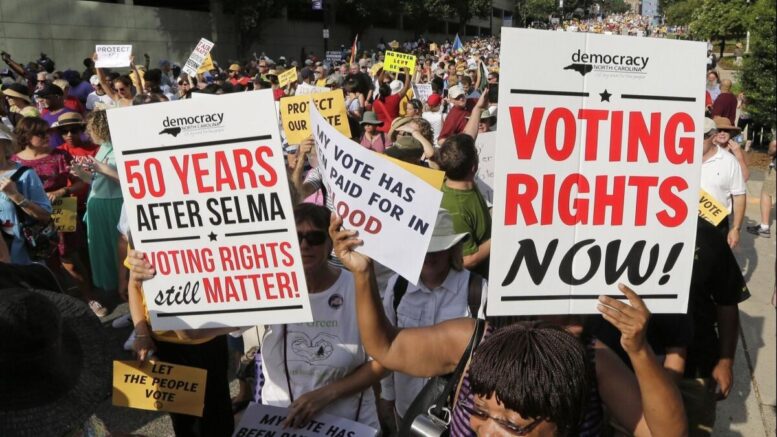As the 2024 presidential election approaches, the importance of exercising the right to vote cannot be overstated. Voting is a fundamental democratic right that allows citizens to influence the direction of their country. For Black Americans, the right to vote is a hard-won privilege, achieved through centuries of struggle, sacrifice, and perseverance. Understanding the historical context of voting rights for Black Americans and recognizing the pivotal role the Black Church and Black clergy have played in advocating for these rights highlights the profound significance of participating in the electoral process.
Historical Exclusion of Black Voters
From the days of slavery to the civil rights movement, there have been systematic attempts to disenfranchise Black voters. During slavery, Black people had no legal rights, including the right to vote. Following the Civil War and the abolition of slavery, the 15th Amendment, ratified in 1870, theoretically granted Black men the right to vote. However, various discriminatory practices effectively nullified this right.
Jim Crow laws in the South imposed literacy tests, poll taxes, and grandfather clauses designed to exclude Black voters. These laws were accompanied by widespread intimidation and violence. For instance, the 1898 Wilmington Massacre saw white supremacists overthrow a legitimately elected biracial government in North Carolina, killing many Black citizens and forcing others to flee.
The Civil Rights Movement of the 1950s and 1960s marked a turning point in the fight for voting rights. The efforts of activists culminated in the passage of the Voting Rights Act of 1965, which aimed to eliminate the legal barriers preventing Black Americans from voting. This landmark legislation prohibited racial discrimination in voting, providing federal oversight and enforcement in areas with a history of discriminatory practices.
The Role of the Black Church and Clergy
The Black Church has been a cornerstone of the African American community, serving as a center for spiritual support, social activism, and political mobilization. Black clergy have been at the forefront of the struggle for civil rights, using their positions of influence to advocate for justice and equality.
- Reverend Dr. Martin Luther King Jr.: Perhaps the most iconic figure of the Civil Rights Movement, Dr. King’s leadership in nonviolent protests and his powerful oratory galvanized the movement and brought national attention to the issue of voting rights.
- Reverend Ralph Abernathy: A close associate of Dr. King, Abernathy co-founded the Southern Christian Leadership Conference (SCLC) and played a crucial role in organizing the Selma to Montgomery marches, which highlighted the need for voting rights legislation.
- Reverend Joseph Lowery: Known as the “Dean of the Civil Rights Movement,” Lowery co-founded the SCLC and was instrumental in the movement’s successes, including the passage of the Voting Rights Act.
- Reverend Jesse Jackson: A prominent activist and politician, Jackson has been a tireless advocate for voter registration and political participation among African Americans, founding the Rainbow PUSH Coalition to promote social justice.
- Reverend C.T. Vivian: A key member of the SCLC, Vivian’s courageous activism, including enduring brutal assaults during protests, underscored the movement’s commitment to securing voting rights for all.
Impact of Black Voters in Presidential Elections
Black voters have played a decisive role in several key presidential elections, demonstrating the power and importance of their participation.
- John F. Kennedy (1960): The Black vote was crucial in Kennedy’s narrow victory. His outreach to the Black community, including his intervention in the arrest of Dr. King, garnered significant support.
- Lyndon B. Johnson (1964): Johnson’s advocacy for civil rights, including the passage of the Civil Rights Act of 1964 and the Voting Rights Act of 1965, earned him overwhelming support from Black voters.
- William Clinton (1992, 1996): Clinton’s policies and engagement with the Black community, as well as his support for affirmative action and economic opportunities, secured him strong backing in both his elections.
- Barack Obama (2008, 2012): As the first Black president, Obama inspired record levels of Black voter turnout, which was instrumental in his historic victories.
- Joe Biden (2020): Black voters, particularly in key swing states, were crucial to Biden’s victory. His selection of Kamala Harris as his running mate also energized the Black electorate.
Conclusion
The right to vote is a powerful tool for change and an essential component of democracy. For Black Americans, exercising this right is not just a civic duty but a tribute to the generations who fought tirelessly to secure it. As we approach the 2024 presidential election, it is vital to remember the sacrifices made and the progress achieved. Voting is a way to honor that legacy and ensure that every voice is heard, and every vote counts.

Be the first to comment on "Can You Hear Me Now: The Role of the Black Church in Presidential Elections"